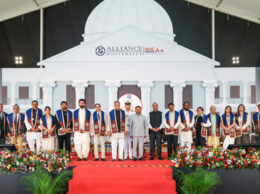London/Mumbai: Which educational institutes are the world’s best universities under 50 years of age? These universities have the potential to disrupt, or indeed have already disrupted, the global elite. QS Quacquarelli Symonds, global higher education think tank, has now released a ranking of the world’s best universities under 50 years of age. Australia is the most-featured nation on the ranking, with its young universities taking ten of the fifty available places. Asian universities are also highly featured as sixteen of the fifty available places go to Asian institutions.
Nanyang Technological University, based in Singapore, retains the number-one position in the QS Top 50 Under 50 2016-2017 rankings. Surprisingly, Asian educational institutions grab the top six spots, while six of the top-ten places are taken by universities with a heavy STEM focus. Australia’s highest-ranked university is the University of Technology, Sydney, which has risen six places to 8th in this year’s ranking, off the back of its rise into the top 200 in the recently-published QS World University Rankings 2016/17.
QS’s Head of Research, Ben Sowter, said: “The rankings suggest that young universities focussed on strong STEM-based research programs stand the best chance of disrupting any established global elite.”
A total of eighteen universities from Europe feature in the available 50 places. However, Europe’s highest-ranked university is Maastricht University (7th). The Dutch institution has risen one place in this ranking. Spain is the most-represented European nation, with five ranked universities. The Universitat Autónoma de Barcelona is the world’s 9th-best ‘Under-50’ university this year.
Taiwanese institutions are major beneficiaries this year. Three of their universities are ranked in the top 50. This is one more than last year, and both National Taiwan University of Science and Technology and National Yang Ming University see considerable rises.
The UK sees its share of top young universities decrease to two after a number of its ‘Plate Glass’ institutions, founded in 1966, become ineligible for the ranking.
Qatar University enters the top 50 for the first time after entering the top 400 in the QS World University Rankings. It is 49th in this year’s QS Top 50 Under 50 Rankings. This year’s ranking indicates that Asia and Australia are home to the world’s strongest recently-formed institutions.
No universities from India find the Top 50 positions of the Global Young Universities Rankings. Indian Institute of Technology (IIT) Guwahati is featured only at the ranking band of 71-80 in the list.
| QS University Rankings: Top 50 Under 50 2016/17
|
||
| Rank | Institution Name | Country/ Territory |
| 1 | Nanyang Technological University (NTU) | SG |
| 2 | The Hong Kong University of Science and Technology (HKUST) | HK |
| 3 | KAIST – Korea Advanced Institute of Science and Technology | KR |
| 4 | City University of Hong Kong | HK |
| 5 | Pohang University of Science and Technology (POSTECH) | KR |
| 6 | The Hong Kong Polytechnic University | HK |
| 7 | Maastricht University | NL |
| 8 | University of Technology, Sydney (UTS) | AU |
| 9 | Universitat Autónoma de Barcelona | ES |
| 10 | University of Antwerp | BE |
| Source: http://www.TopUniversities.com/ | ||









